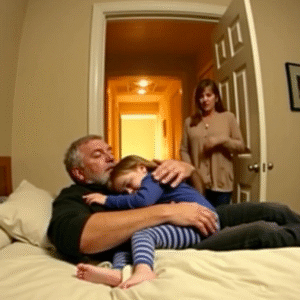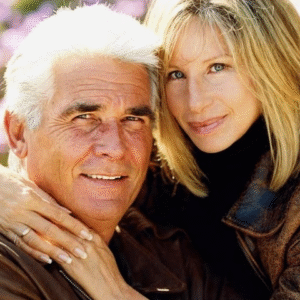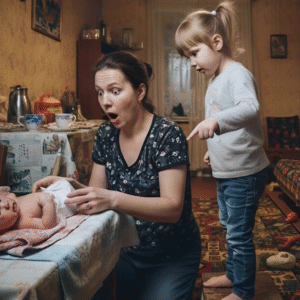The sun had just begun to rise above the rooftops when seven-year-old Tyler dragged his small wooden table to the edge of the sidewalk. He moved slowly, his thin arms trembling from effort, but he refused to ask for help.
This stand, this moment, this tiny act of independence—he wanted it to be his. He wanted to feel, even for a little while, like a normal child doing something simple and hopeful on a summer day.He placed a stack of paper cups on the corner of the table, each one carefully aligned, as if the neatness alone could convince people to stop.
He opened the lid of the bright blue cooler beside him and checked the pitcher of lemonade his mother had helped him make that morning. The sweet scent of lemons and sugar drifted into the air, but the street around him remained quiet, still waking up, still unaware of the little boy sitting under the shade of an old maple tree.
Tyler wore a bright yellow cap pulled low over his head. Beneath it, he hid the baldness that had come not from childhood mischief or a daring haircut, but from the harsh treatments he had endured over the past year. The cap made him feel confident, even though he was painfully aware of how different he looked.
His illness had carved sharp shadows into his cheeks, had thinned his arms and legs, and had taken the easy, carefree joy that children his age were supposed to carry effortlessly.

Still, he smiled.
Still, he straightened the cups.
Still, he waited.
Across the street, a few neighbors came out to sweep their porches or water their plants. Some glanced in his direction but quickly looked away. Others gave small, sympathetic smiles before returning to their routines. One car slowed as it approached, the driver briefly considering a stop, but then accelerated again with an apologetic wave.
To most people, it appeared to be just another lemonade stand. A cute attempt by a child to earn a few coins or pass a sunny afternoon.
What they didn’t see—or perhaps didn’t want to see—was the quiet exhaustion in Tyler’s posture, the way he paused to catch his breath after lifting the pitcher, or the sadness that flickered across his face every time someone walked by without stopping.
He had been sitting there for hours.
And still, not a single cup had been sold.
An Empty Stand and a Heavy Secret
From my porch across the street, I watched him. At first casually, then with growing discomfort. Something about the way he kept straightening the cups over and over again, trying to maintain a sense of purpose despite the stillness around him, tugged at me. The smile he kept forcing onto his face didn’t look like a child having fun—it looked like a child trying not to cry.
I told myself I would go over soon, buy a cup, encourage him. But I hesitated, unsure what to say, unsure how to approach a situation that felt heavier than it appeared.
And then I noticed something.
Under the big sign that read “LEMONADE — 50 CENTS”, there was another note, much smaller, taped so discreetly that a passerby might not notice it unless they stood right in front of the table.
Even from where I sat, I could tell the handwriting was shaky. The letters leaned to one side. The edges of the note fluttered in the breeze, revealing glimpses of a longer message underneath.
At the time, I didn’t know what it said.
I didn’t know that this hidden note held the truth about why Tyler was out there alone.
I didn’t know the weight he was carrying on those small shoulders.
But I would soon learn that he wasn’t selling lemonade at all.
He was trying to buy peace of mind for someone else.
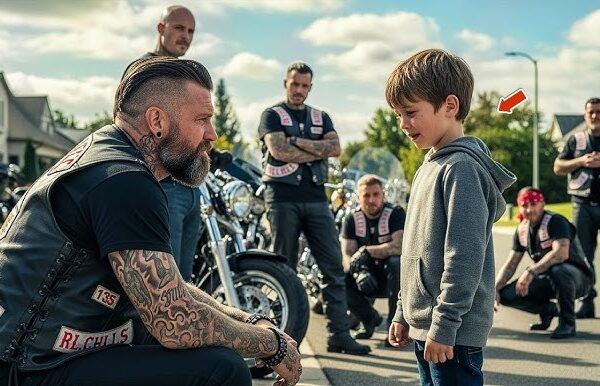
Four Riders Who Changed Everything
It happened just past noon, when the quiet suburban street echoed with the deep rumble of motorcycle engines. Four bikers turned the corner, their leather jackets, heavy boots, and roaring machines creating a sudden contrast against the peaceful row of houses.
People peeked from behind curtains.
Dogs barked.
A few neighbors stepped outside, unsure what to make of the unexpected sight.
The bikers slowed as they approached Tyler’s stand, their engines growling low like distant thunder. The lead biker, a broad-shouldered man with a gray beard and a vest covered in military patches, stopped directly in front of the tiny table.
His name, stitched across his chest, read Bear.
Tyler looked up, startled at first, but then uncertain. He nervously adjusted the brim of his cap. The contrast between him—a small, fragile child—and the towering man stepping off the motorcycle was almost surreal.
Bear walked toward him slowly, his heavy boots crunching against the gravel. He knelt down to be eye-level with Tyler, and for a moment, neither of them spoke.
Then Bear noticed it.
The small, handwritten note partially tucked behind the “50 cents” sign.
He gently pulled it forward to read it.
And as his eyes moved down the page, his expression shifted from curiosity to heartbreak. The tough exterior, the leather vest, the Marine patches—all of it melted into something raw and vulnerable.
Tears formed in the corners of his eyes.
Real, unguarded tears.
When he finished reading, Bear placed a large, calloused hand on the table to steady himself. He swallowed hard, as if fighting back a wave of emotion, then reached into his pocket and pulled out a crisp hundred-dollar bill.
Without saying a word, he folded it once and placed it into Tyler’s empty jar.
But that was only the beginning.
He stood up, wiped his face with the back of his hand, turned toward the other riders, and raised two fingers in the air—a silent signal only they seemed to understand.
The others nodded.
Within seconds, they were pulling out their phones.
Calls were made.
Messages were sent.
Engines revved in the distance, growing louder, closer.
And before long, everything about that quiet, lonely lemonade stand was about to change.
The rumble of engines grew louder by the minute. What had started as four motorcycles soon became a steady stream of chrome, leather, and compassion rolling down our quiet suburban street.
Neighbors stepped onto their porches, drawn by the sudden energy in the air. Curtains were pulled back. Children pressed their faces against windows. Something extraordinary was unfolding, something no one on our block could have predicted.
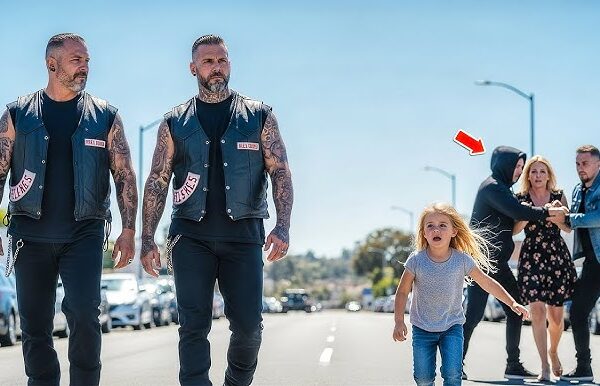
A Gathering That Transformed a Neighborhood
One by one, riders slowed to a stop near Tyler’s stand, parking along the curb with precision and respect. Some removed their helmets, revealing faces lined by years, sun, and stories. Others kept them on, too overwhelmed to speak. But the feeling was the same for each of them: a deep, instinctive pull toward the tiny lemonade stand and the little boy sitting behind it.
Bear remained by Tyler’s side, kneeling protectively beside him as if guarding something sacred. When the first group of new riders approached, Bear simply pointed at the small, handwritten note beneath the price sign. They read it silently, their expressions shifting from curiosity to heartbreak, then to determination.
It wasn’t long before Tyler’s empty glass jar—once ignored by everyone who passed—began to fill with bills. Tens, twenties, fifties, hundreds. Some riders knelt down and gave Tyler a gentle fist bump. Others whispered words of encouragement that made his eyes brighten for the first time all day.
The Hidden Message That Started It All
The note was simple, written in shaky pencil strokes:
“I am trying to help my mom with my funeral costs. She cries when she thinks I can’t hear her. I don’t want her to worry anymore.”
No one who read it remained the same.
It was the kind of message that sliced through every barrier, every stereotype, every assumption. It turned bikers into protectors. Strangers into family. A sick child into a symbol of courage greater than any of us understood.
Bear read the message twice. Some riders read it three or four times, as if trying to absorb the weight of each word. It wasn’t pity that moved them—it was respect. Respect for a child who should have been thinking about toys and summer games, not funeral expenses. Respect for a mother silently carrying heartbreak no parent should ever have to bear.
A Circle of Strength Around a Small Warrior
Within an hour, nearly fifty bikers had gathered. They formed a protective ring around the lemonade stand, not to block it but to honor it. They stood in silence for a moment, helmets pressed to their chests, engines turned off except for one that idled gently—a symbolic heartbeat echoing through the warm afternoon air.
And then, as if on cue, something remarkable happened.
One rider stepped forward and asked Tyler if he could have a cup of lemonade. Tyler’s face lit up with pride, and he poured the drink as best he could with his unsteady hands. The man drank it slowly, savoring the moment more than the flavor, then slipped another bill into the jar.
Another biker followed. Then another. And another.
The lemonade wasn’t what they came for.
They came for him.

A Community Transformed by Kindness
Word spread quickly. Cars began stopping. Families who had earlier crossed the street now walked directly toward the stand. Some brought envelopes. Others offered hugs. A few quietly wiped away tears, embarrassed by their earlier reluctance.
What had been a lonely, fragile moment became an overwhelming wave of support. The stand that had been completely ignored just hours earlier was now surrounded by dozens of people—bikers, neighbors, strangers—each of them wanting to help. Each of them wanting to be part of something meaningful.
Tyler, once invisible, was now the center of a community he never knew he had.
The Bikers Return—Again and Again
The story didn’t end that day. The riders came back the next morning. And the next. And the next. They brought chairs, coolers, umbrellas, snacks, and stories. They made sure Tyler always had shade. They sat with him for hours, listening to his dreams, his fears, and his hopes.
Some taught him how to honk a motorcycle horn. Others let him sit on their bikes, lifting him gently to make sure he felt like the superhero they believed him to be.
They organized events—lemonade runs, charity rides, community fundraisers. In a few short weeks, they raised tens of thousands of dollars, not because they were wealthy, but because they were determined.
Determined that Tyler’s mother would not face financial devastation during the hardest moment of her life. Determined that her son would know he mattered.
A Final Ride for a Little Hero
As Tyler’s condition worsened, the riders built him a special chair—soft, shaded, and decorated with patches from their clubs. They wanted him to always be comfortable, always feel included, and always know that he was part of their family.
On the last day he was strong enough to come outside, more than two hundred bikers lined the street. Engines hummed in unison like a lullaby of strength and solidarity. When Tyler was carried out to join them, the riders erupted into applause—deep, thunderous, heartfelt applause for a boy who had changed their lives.
He smiled—a tired but radiant smile—and waved.
It would be the last time he sat at the lemonade stand.
An Honor Guard for a Warrior’s Goodbye
When Tyler passed away, the grief rippled far beyond our neighborhood. Messages poured in from across the state. Bikers traveled from hundreds of miles away to attend his funeral. They wore their uniforms and patches, but their faces were soft with sorrow.
They formed an honor guard outside the church, standing shoulder to shoulder in complete silence as the small white casket was carried past them. Some saluted. Some placed their hands over their hearts. Some wept openly, unashamed of their emotion.
Tyler had not sold lemonade.
He had built a movement.

A Legacy That Lives On
Months later, the riders created the Tyler Morrison Memorial Fund, dedicated to helping children battling cancer. Every year, they host rides, fundraisers, and community events in his name. Thousands of dollars have been donated to families in need, all inspired by one courageous little boy and his quiet wish to ease his mother’s burden.
His mother still keeps the lemonade stand in her garage.
The faded “50 Cents” sign is still taped to the front.
And the small handwritten note—the note that changed everything—is preserved in a frame on her wall.
Every so often, a biker knocks on her door and asks softly:
“Is the lemonade stand open today?”
Not because they expect lemonade.
But because they want to honor a life that proved a powerful truth:
Even the smallest child can inspire enormous compassion.
Even the tiniest warrior can bring a community together.
And even the quietest plea can echo for generations.
The sun had just begun to rise above the rooftops when seven-year-old Tyler dragged his small wooden table to the edge of the sidewalk. He moved slowly, his thin arms trembling from effort, but he refused to ask for help.
This stand, this moment, this tiny act of independence—he wanted it to be his. He wanted to feel, even for a little while, like a normal child doing something simple and hopeful on a summer day.He placed a stack of paper cups on the corner of the table, each one carefully aligned, as if the neatness alone could convince people to stop.
He opened the lid of the bright blue cooler beside him and checked the pitcher of lemonade his mother had helped him make that morning. The sweet scent of lemons and sugar drifted into the air, but the street around him remained quiet, still waking up, still unaware of the little boy sitting under the shade of an old maple tree.
Tyler wore a bright yellow cap pulled low over his head. Beneath it, he hid the baldness that had come not from childhood mischief or a daring haircut, but from the harsh treatments he had endured over the past year. The cap made him feel confident, even though he was painfully aware of how different he looked.
His illness had carved sharp shadows into his cheeks, had thinned his arms and legs, and had taken the easy, carefree joy that children his age were supposed to carry effortlessly.

Still, he smiled.
Still, he straightened the cups.
Still, he waited.
Across the street, a few neighbors came out to sweep their porches or water their plants. Some glanced in his direction but quickly looked away. Others gave small, sympathetic smiles before returning to their routines. One car slowed as it approached, the driver briefly considering a stop, but then accelerated again with an apologetic wave.
To most people, it appeared to be just another lemonade stand. A cute attempt by a child to earn a few coins or pass a sunny afternoon.
What they didn’t see—or perhaps didn’t want to see—was the quiet exhaustion in Tyler’s posture, the way he paused to catch his breath after lifting the pitcher, or the sadness that flickered across his face every time someone walked by without stopping.
He had been sitting there for hours.
And still, not a single cup had been sold.
An Empty Stand and a Heavy Secret
From my porch across the street, I watched him. At first casually, then with growing discomfort. Something about the way he kept straightening the cups over and over again, trying to maintain a sense of purpose despite the stillness around him, tugged at me. The smile he kept forcing onto his face didn’t look like a child having fun—it looked like a child trying not to cry.
I told myself I would go over soon, buy a cup, encourage him. But I hesitated, unsure what to say, unsure how to approach a situation that felt heavier than it appeared.
And then I noticed something.
Under the big sign that read “LEMONADE — 50 CENTS”, there was another note, much smaller, taped so discreetly that a passerby might not notice it unless they stood right in front of the table.
Even from where I sat, I could tell the handwriting was shaky. The letters leaned to one side. The edges of the note fluttered in the breeze, revealing glimpses of a longer message underneath.
At the time, I didn’t know what it said.
I didn’t know that this hidden note held the truth about why Tyler was out there alone.
I didn’t know the weight he was carrying on those small shoulders.
But I would soon learn that he wasn’t selling lemonade at all.
He was trying to buy peace of mind for someone else.

Four Riders Who Changed Everything
It happened just past noon, when the quiet suburban street echoed with the deep rumble of motorcycle engines. Four bikers turned the corner, their leather jackets, heavy boots, and roaring machines creating a sudden contrast against the peaceful row of houses.
People peeked from behind curtains.
Dogs barked.
A few neighbors stepped outside, unsure what to make of the unexpected sight.
The bikers slowed as they approached Tyler’s stand, their engines growling low like distant thunder. The lead biker, a broad-shouldered man with a gray beard and a vest covered in military patches, stopped directly in front of the tiny table.
His name, stitched across his chest, read Bear.
Tyler looked up, startled at first, but then uncertain. He nervously adjusted the brim of his cap. The contrast between him—a small, fragile child—and the towering man stepping off the motorcycle was almost surreal.
Bear walked toward him slowly, his heavy boots crunching against the gravel. He knelt down to be eye-level with Tyler, and for a moment, neither of them spoke.
Then Bear noticed it.
The small, handwritten note partially tucked behind the “50 cents” sign.
He gently pulled it forward to read it.
And as his eyes moved down the page, his expression shifted from curiosity to heartbreak. The tough exterior, the leather vest, the Marine patches—all of it melted into something raw and vulnerable.
Tears formed in the corners of his eyes.
Real, unguarded tears.
When he finished reading, Bear placed a large, calloused hand on the table to steady himself. He swallowed hard, as if fighting back a wave of emotion, then reached into his pocket and pulled out a crisp hundred-dollar bill.
Without saying a word, he folded it once and placed it into Tyler’s empty jar.
But that was only the beginning.
He stood up, wiped his face with the back of his hand, turned toward the other riders, and raised two fingers in the air—a silent signal only they seemed to understand.
The others nodded.
Within seconds, they were pulling out their phones.
Calls were made.
Messages were sent.
Engines revved in the distance, growing louder, closer.
And before long, everything about that quiet, lonely lemonade stand was about to change.
The rumble of engines grew louder by the minute. What had started as four motorcycles soon became a steady stream of chrome, leather, and compassion rolling down our quiet suburban street.
Neighbors stepped onto their porches, drawn by the sudden energy in the air. Curtains were pulled back. Children pressed their faces against windows. Something extraordinary was unfolding, something no one on our block could have predicted.

A Gathering That Transformed a Neighborhood
One by one, riders slowed to a stop near Tyler’s stand, parking along the curb with precision and respect. Some removed their helmets, revealing faces lined by years, sun, and stories. Others kept them on, too overwhelmed to speak. But the feeling was the same for each of them: a deep, instinctive pull toward the tiny lemonade stand and the little boy sitting behind it.
Bear remained by Tyler’s side, kneeling protectively beside him as if guarding something sacred. When the first group of new riders approached, Bear simply pointed at the small, handwritten note beneath the price sign. They read it silently, their expressions shifting from curiosity to heartbreak, then to determination.
It wasn’t long before Tyler’s empty glass jar—once ignored by everyone who passed—began to fill with bills. Tens, twenties, fifties, hundreds. Some riders knelt down and gave Tyler a gentle fist bump. Others whispered words of encouragement that made his eyes brighten for the first time all day.
The Hidden Message That Started It All
The note was simple, written in shaky pencil strokes:
“I am trying to help my mom with my funeral costs. She cries when she thinks I can’t hear her. I don’t want her to worry anymore.”
No one who read it remained the same.
It was the kind of message that sliced through every barrier, every stereotype, every assumption. It turned bikers into protectors. Strangers into family. A sick child into a symbol of courage greater than any of us understood.
Bear read the message twice. Some riders read it three or four times, as if trying to absorb the weight of each word. It wasn’t pity that moved them—it was respect. Respect for a child who should have been thinking about toys and summer games, not funeral expenses. Respect for a mother silently carrying heartbreak no parent should ever have to bear.
A Circle of Strength Around a Small Warrior
Within an hour, nearly fifty bikers had gathered. They formed a protective ring around the lemonade stand, not to block it but to honor it. They stood in silence for a moment, helmets pressed to their chests, engines turned off except for one that idled gently—a symbolic heartbeat echoing through the warm afternoon air.
And then, as if on cue, something remarkable happened.
One rider stepped forward and asked Tyler if he could have a cup of lemonade. Tyler’s face lit up with pride, and he poured the drink as best he could with his unsteady hands. The man drank it slowly, savoring the moment more than the flavor, then slipped another bill into the jar.
Another biker followed. Then another. And another.
The lemonade wasn’t what they came for.
They came for him.

A Community Transformed by Kindness
Word spread quickly. Cars began stopping. Families who had earlier crossed the street now walked directly toward the stand. Some brought envelopes. Others offered hugs. A few quietly wiped away tears, embarrassed by their earlier reluctance.
What had been a lonely, fragile moment became an overwhelming wave of support. The stand that had been completely ignored just hours earlier was now surrounded by dozens of people—bikers, neighbors, strangers—each of them wanting to help. Each of them wanting to be part of something meaningful.
Tyler, once invisible, was now the center of a community he never knew he had.
The Bikers Return—Again and Again
The story didn’t end that day. The riders came back the next morning. And the next. And the next. They brought chairs, coolers, umbrellas, snacks, and stories. They made sure Tyler always had shade. They sat with him for hours, listening to his dreams, his fears, and his hopes.
Some taught him how to honk a motorcycle horn. Others let him sit on their bikes, lifting him gently to make sure he felt like the superhero they believed him to be.
They organized events—lemonade runs, charity rides, community fundraisers. In a few short weeks, they raised tens of thousands of dollars, not because they were wealthy, but because they were determined.
Determined that Tyler’s mother would not face financial devastation during the hardest moment of her life. Determined that her son would know he mattered.
A Final Ride for a Little Hero
As Tyler’s condition worsened, the riders built him a special chair—soft, shaded, and decorated with patches from their clubs. They wanted him to always be comfortable, always feel included, and always know that he was part of their family.
On the last day he was strong enough to come outside, more than two hundred bikers lined the street. Engines hummed in unison like a lullaby of strength and solidarity. When Tyler was carried out to join them, the riders erupted into applause—deep, thunderous, heartfelt applause for a boy who had changed their lives.
He smiled—a tired but radiant smile—and waved.
It would be the last time he sat at the lemonade stand.
An Honor Guard for a Warrior’s Goodbye
When Tyler passed away, the grief rippled far beyond our neighborhood. Messages poured in from across the state. Bikers traveled from hundreds of miles away to attend his funeral. They wore their uniforms and patches, but their faces were soft with sorrow.
They formed an honor guard outside the church, standing shoulder to shoulder in complete silence as the small white casket was carried past them. Some saluted. Some placed their hands over their hearts. Some wept openly, unashamed of their emotion.
Tyler had not sold lemonade.
He had built a movement.

A Legacy That Lives On
Months later, the riders created the Tyler Morrison Memorial Fund, dedicated to helping children battling cancer. Every year, they host rides, fundraisers, and community events in his name. Thousands of dollars have been donated to families in need, all inspired by one courageous little boy and his quiet wish to ease his mother’s burden.
His mother still keeps the lemonade stand in her garage.
The faded “50 Cents” sign is still taped to the front.
And the small handwritten note—the note that changed everything—is preserved in a frame on her wall.
Every so often, a biker knocks on her door and asks softly:
“Is the lemonade stand open today?”
Not because they expect lemonade.
But because they want to honor a life that proved a powerful truth:
Even the smallest child can inspire enormous compassion.
Even the tiniest warrior can bring a community together.
And even the quietest plea can echo for generations.
